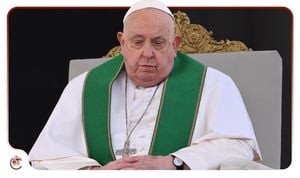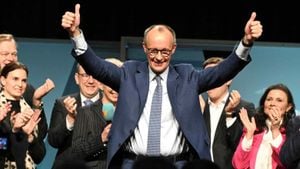The 2025 Bundestagswahl, held on February 23, marks a pivotal moment for German politics, particularly in the populous state of North Rhine-Westphalia (NRW). With approximately 12.6 million eligible voters, the election yielded significant electoral shifts largely influenced by public sentiment surrounding the former government.
Initial results indicate the CDU, under the leadership of Friedrich Merz, claimed approximately 30.1% of the votes, establishing itself as the dominant party. This was followed by the SPD at 20.2%, the AfD at 16.3%, and the Greens at 12.6%. The election, notable for its increased voter turnout—estimated at 83.1%, up from 76.4% during the last election—reflects broader trends within the electorate, which are reshaping Germany's political scene.
NRW’s elections are particularly illustrative of the shifting political winds. "The people want a political change," remarked NRW Minister President Hendrik Wüst on the strong performance of the CDU, signaling the electorate's desire for new leadership and governance. This sentiment appears rooted in the public's response to the previous government’s shortcomings, exacerbated by the controversies surrounding coalition politics.
Significantly, the SPD suffered substantial losses, with Co-Chair Achim Post calling the outcome "an extremely bitter moment for the SPD," acknowledging the party's challenges amid growing frustrations from constituents. His statement encapsulates the disappointment felt within the party ranks, faced with the reality of the electorate’s shifting priorities.
Conversely, the AfD proclaimed its growing influence, especially within the region. "We are the only serious opposition in Germany," asserted Martin Vincentz, the leader of the AfD parliamentary group, underscoring his party's strategy of positioning itself as the alternative voice and its successful outreach to disenchanted voters. The party's performance, particularly its strong showing in regions like Gelsenkirchen—where it achieved its highest share of 24.7%—demonstrates its establishment as a formidable force even amid criticism of its far-right ideology.
This election also introduced changes through new electoral legislation aimed at restructuring the Bundestag from 733 to 630 seats, employing a mixed-member proportional representation system. This alteration means not all successful constituency candidates automatically gain seats, depending instead on their party’s overall performance on the ballot. It is anticipated these new rules will shape future election strategies and party alliances, complicate the pathway to representation for minor parties, and potentially alter voter behaviors.
The surge in voter engagement this election contrasts markedly with previous trends. Several cities, including Dortmund and Bochum, reported heightened voter turnout compared to 2021, with participation rates reaching notable highs. The atmosphere leading up to the election suggested growing enthusiasm among voters, likely fueled by local issues and political accountability. Voters had more reasons to engage, and the results reflect their will to hold parties responsible for their governance.
With these results, the dialogue surrounding NRW’s political future is more relevant than ever. Hendrik Wüst emphasized the need for decisive action and coalition-building among centrist parties to address pressing issues facing the state. The question now remains: how will these parties navigate the new political terrain, which appears increasingly influenced by the populist sentiments championed by the AfD?
The implication of this election extends beyond immediate party standings, as it poses fundamental questions about the direction of German politics amid shifting demographics and priorities. Will traditional parties adapt to this reality, or will they risk alienation from voters turned off by their responses? The 2025 Bundestagswahl serves as both a reflection of current sentiments and as a bellwether for the future political climate, necessitating introspection and strategic adaptation among all political entities.



